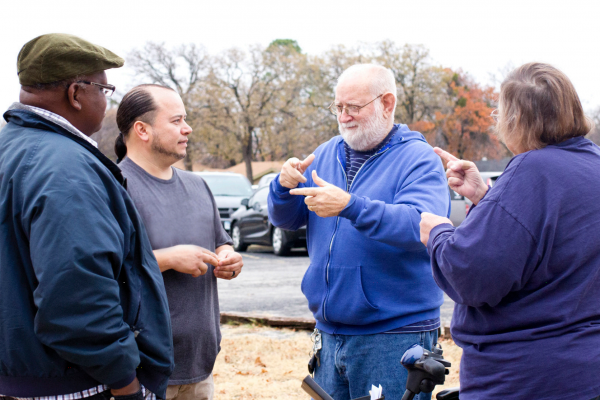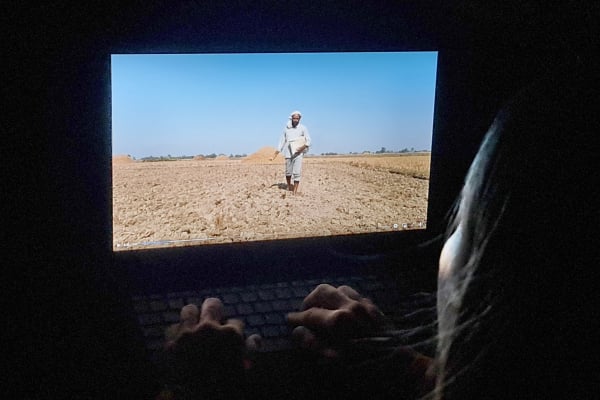
Is God Leading Me to Serve Overseas?
Six Questions to Ask
Scripture is clear: Every believer is called to be involved in the Great Commission. But that still leaves a big question that isn’t addressed nearly as directly in God’s Word: How do you know if the Lord is leading you to serve in full-time cross-cultural ministry?
While determining God’s specific leading for your life isn’t quite as straightforward as recognizing His call to every believer, He is guiding you. These six questions can help you discern His leading as you consider missions.
Are you sharing the gospel now?
Before you seriously consider serving overseas, take an honest look at what you’re doing now to share the gospel and make disciples. How often do you talk about your faith with others who don’t know Jesus? If you’re not currently telling your neighbors, friends or coworkers the good news, a plane ride across the ocean isn’t going to turn you into someone with a heart that longs to proclaim the gospel.
Are you involved in a local church?
There’s no substitute for the local church—especially when you’re considering missions. God designed us to be part of His global Body and of a local body of believers, and it’s often in the context of a local church that He guides and prepares us for ministry.
Being part of a church community provides you with opportunities to serve that will equip you to minister more effectively however God leads you in the future. Missions among the least-reached is about being a representative of the Body of Christ in places where local fellowships of believers don’t yet exist. Experience in an existing church is vital preparation for establishing healthy, sustainable churches in these places.
As you get involved, you’ll discover both how God’s gifted you and areas in which you need to grow—and often, you’ll be able to hone your strengths and work on your weaknesses as you serve. In addition, being involved in a church body places you amid mature believers who can invest in you, encouraging and praying for you as you seek God’s leading.
In addition, the model set for us in Acts shows that local churches are the entities that send workers to the field and that sending involves a relationship of accountability. When you’re commissioned by a congregation for cross-cultural ministry, you become a representative of that local body of Christ in a least-reached community. By sending, your church commits to backing your ministry not only through finances but through prayer and practical support. But this can only happen if you’re first part of a local body of believers.
Are you listening for God’s voice?
Every cross-cultural worker has a story of the ways God led him or her. While these stories differ from person to person, they contain a common thread: The Lord often leads through a combination of His Spirit, His Word, His people and circumstances.
“If you’re a believer and close to God, trust what He’s telling you through people and through His Word.” says Merv, a Christar mobilizer who previously served with his wife in Africa. “It’s not an audible call, but He is talking to you.”
Are you serving where you are?
When you’re not sure what God wants you to do, it can be easy to stay put and wait for guidance. But often, God directs us to specific ministry opportunities while we’re actively serving Him.
We see this in the example of Philip. After Stephen was stoned, many of the believers were scattered away from Jerusalem and Saul’s persecution of the Jews. We’re told in Acts 8:4-5, “Now those who were scattered went about preaching the word. Philip went down to the city of Samaria and proclaimed to them the Christ.” As far as we know, Philip received no special instructions from God; he just proclaimed the good news where he was.
But while he was there—already involved in ministry—God gave him very specific directions: “Now an angel of the Lord said to Philip, ‘Go south to the road—the desert road—that goes down from Jerusalem to Gaza.’” Philip obeyed and met an Ethiopian eunuch who had been reading Isaiah and was ready to hear the gospel.
Likewise, the Lord clearly guided Paul while he was already going to preach the good news. Throughout much of Paul’s missionary journeys, we see Paul and his companions moving from place to place without overt guidance from God. But amid Paul’s second journey, God clearly directs him to Macedonia in a vision:
“And a vision appeared to Paul in the night: a man of Macedonia was standing there, urging him and saying, 'Come over to Macedonia and help us.' And when Paul had seen the vision, immediately we sought to go on into Macedonia, concluding that God had called us to preach the gospel to them.” (Acts 16:9-10)
In addition, serving where you are can help you discover how God can use your gifts and experience for His glory, which can enable you to spot opportunities that would be a good fit for the way He’s made you. And, if you’re already involved in missions, you’re more likely to learn about other ways you could minister.
Are you moving forward?
If God has given you a burden for the least-reached and the ability to go, you don’t need to wait for confirmation to start taking steps in that direction. In a contribution to Ask a Missionary: Time-Tested Answers from Those Who've Been There Before, Elisabeth Elliot wrote,
"When Jim Elliot was considering missions, he didn’t know where to go or what to do. But he did have two ideas. So he started corresponding with one missionary in India and another in Ecuador. In view of the information he received, he made a choice: Ecuador. But before deciding, he first did a lot of thinking and praying. It wasn’t a wild guess but an act of faith in the God who promises to guide.
Jim used to say, 'you can’t steer a parked car.' It makes sense to move in the direction you believe God is leading, trusting Him as a faithful shepherd to lead you in paths of righteousness."
As many workers currently on the field can attest, God often leads us when we move forward in faith. By taking a next step, such as gaining ministry experience among refugees in your neighborhood or going on a short-term trip to explore ministry opportunities, you’re living out your trust that God will lead you.
Have you talked to people with missions experience?
In addition to listening to the counsel of mature believers who know you well, look for opportunities to talk with cross-cultural workers and learn about the joys and challenges they experience, as well as ask questions about life on the field. Also, consider connecting with a Christar mobilizer, who can answer specific questions about missions and help you find opportunities that are a good fit for your gifts, skills and experience.
As you ask yourself all of these questions, know that the answer to “Can I trust God to lead me?” is always “yes.” He is with you as you seek His guidance, and He is faithful to direct you to the place He has for you in the Great Commission. So, keep asking the hard questions with confidence that He’s at work in you.
We’d love to come alongside you as you explore how God is leading you to be involved in the Great Commission! Just email [email protected].
Scripture quotations are from The ESV® Bible (The Holy Bible, English Standard Version®), © 2001 by Crossway, a publishing ministry of Good News Publishers. Used by permission. All rights reserved.









































_1724957011_600x400.png)
